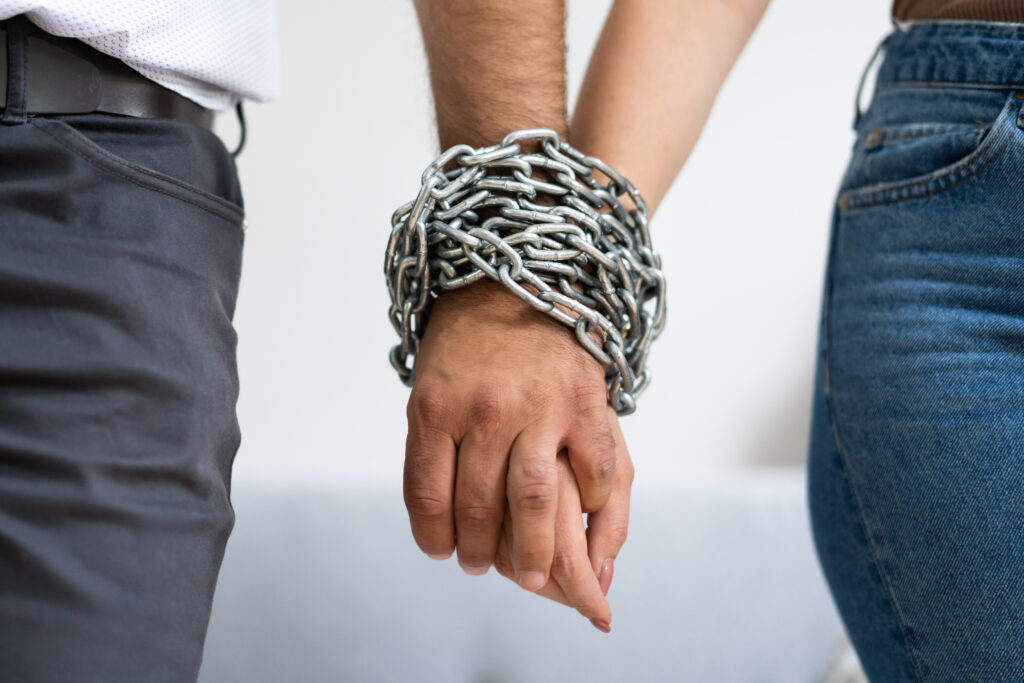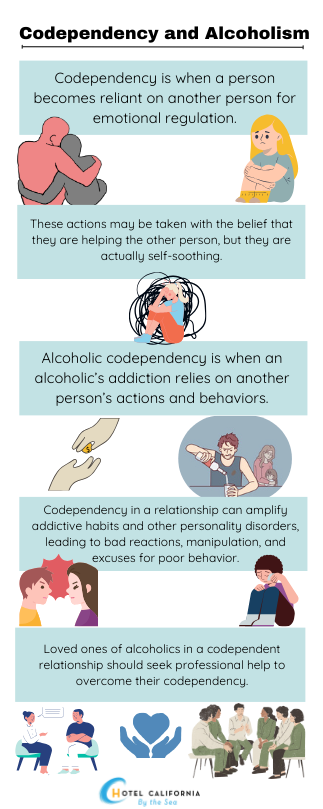Codependency and Alcohol Addiction
Codependency and alcohol addiction are intersecting occurrences. They occur simultaneously, they become a catalyst for each other and they occur quite often in situations of substance use disorder. Especially when it comes to alcohol use disorder. Psychology Today defines codependency as a relationship in which a caring, highly functional and helpful person, supports, enables or perpetuates a loved one’s irresponsibility and destructive behaviors. Codependency is not recognized as an official mental health disorder. It is a significant trigger to alcoholism and alcoholic codependency.

According to the World Health Organization, alcohol takes the life of a person every 10 seconds. Alcohol use disorder is one of the deadliest mental health diseases that affects the population globally. It can alter brain chemistry and cause both physical and psychological damage to the brain and body when abused. It is also the most widely used around the world as a part of cultural, religious and social occasions.
What is Codependency?
Codependency is a mutually satisfying unhealthy relationship between two individuals where one is the giver or enabler, and the other is the taker and usually the one with a substance addiction. An enabler’s support for their loved one often goes beyond what is healthy. Most times, givers are sacrificing their self-worth as the taker continues to take advantage of the one-sided relationship and indulge in bad habits. Despite good intentions, they are allowing their loved ones to continue their addictive behaviors without seeing the real-world consequences.
Research has found that codependency is often triggered by a lack of self-confidence, poor boundaries, poor sense of self, the inability to say no and being a constant people pleaser. People in codependent relationships often find themselves in controlling relationships, feeding into self-esteem issues, and the exacerbation of addictive behaviors. This type of dysfunctional relationship allows for the substance abuser to become comfortable in their situation and gives a place for their addiction to thrive and grow.
There are three common types of codependent relationships. A codependent relationship can be with a person who has a substance or alcohol addiction. A codependent relationship can be with a person who is abusive. A codependent relationship can be with a person based on peer pressure. Codependency often leads to feelings of anxiety, depression, loneliness, feelings of helplessness, isolation and burnout.

Signs you may be in a Codependent Relationship
Four main themes surround codependent behaviors leading to a mutually beneficial relationship. These four themes are associated with various signs that someone you know might be in an alcoholic codependency. A focus on others. Self-sacrifice. Difficulty expressing your emotions. And the need for control.
- The giver or enabler routinely sacrifices their time, responsibility and other activities in order to meet the taker’s or alcoholic’s need. They will take on more than their share of the load of responsibility and neglect their own needs. This can sometimes lead to later feelings of resentment.
- The giver or enabler often feels responsible for their loved one regardless of whether or not the loved one is willing to take any accountability.
- The giver or enabler will often make up excuses for the addictive behaviors of the taker or alcoholic. They will cover for them and often deny there is an issue with either of their problematic behaviors.
- The giver or enabler feels the relationship with the taker is all they have. This often stems from deeper issues of depression, guilt, shame, self-esteem, self-worth and unbalanced emotions.
- Both parties in a codependent relationship will often ignore the unhealthy behaviors including alcohol and substance misuse.
- The giver or enabler will often provide financial support to the taker.
- The giver or enabler will go out of their way to avoid any problems, brush things off and fail to follow through with the consequences of destructive actions.
- The inability to set healthy, reasonable and safe boundaries between both parties.
- Takers usually manipulate others into taking care of them.
- The giver or enabler will often take advantage of the relationship in an attempt to control the other person as well as make themselves responsible for the actions, behaviors and problems of the taker.
Check Your Insurance Coverage for FREE
Find out if your insurance covers addiction treatment in minutes. We accept most insurance!
Codependency and Alcohol Addiction
Alcohol codependency can be destructive and dangerous. It is a two-way relationship. In some cases, alcohol addiction can lead to the development of a codependent relationship. And in other cases, a codependent relationship can lead to a thriving alcohol addiction. It allows alcoholism and alcohol abuse to continue with consequences.
It is not uncommon for those with codependent characteristics to find relationships with people who have a substance use disorder. This is because they have the need to be the caretaker of the relationship. This type of relationship can prevent loved ones from getting the necessary help they need for their mental health condition. It impedes recovery because the person begins to feel like there is no problem or they cannot see the problems clearly because the enabler has continued to take responsibility everywhere.
Codependency is often caused or triggered by the following:
- Negative self-image
- Low self-esteem
- Experiencing traumatic childhood, emotional neglect or abuse (PTSD)
- Worrying about being abandoned
- Not being loved
- Experiencing emotional events such as divorce or death
- Growing up around substance use disorder or alcohol use disorder
- History of depression
Alcoholism is often caused or triggered by the following:
- Genetic predisposition
- Social and cultural environment
- Used as a way to manage difficult feelings or emotions
- Peer pressure
- History of abuse or neglect
Reach out to Hotel California by the Sea
We specialize in treating addiction and other co-occurring disorders, such as PTSD. Our Admissions specialists are available to walk you through the best options for treating your addiction.
Treatment for Alcoholism and Alcoholic Codependency
There is a difference between healthy dependency and unhealthy codependency. Being dependent on another person may mean asking for support when it is needed, feeling safe expressing your needs from the relationship, and being able to set healthy boundaries when you believe the person is asking too much of you. Codependents are often motivated by taking care of others whom they feel are in greater need and in exchange feel validation when they believe they are helping others.
In a codependent relationship, the giver will provide comfort and support to an addict even at their lowest point. During this phase, an addict is unable to see or understand they need help or are in trouble. The lack of self-accountability could lead to further damage to the alcohol use disorder. The best way to break the cycle of alcohol codependency is to get professional help. Hotel California by the Sea is a behavioral health program that specializes in treating alcoholic codependency.
We offer all levels of care including detox, residential and outpatient programs. We utilize evidence-based treatments such as CBT, DBT and group therapy to help clients understand the root causes of their addiction and co-occurring mental health conditions. When it comes to treating alcoholic codependency, treatments such as individual therapy and family therapy can help to set healthy boundaries and educate both parties on the dangers of this type of relationship. Hotel California by the Sea is committed to helping our clients overcome their addictions by healing all aspects of the disease.
References:
https://family-intervention.com/blog/recognizing-the-signs-of-codependency-and-alcoholism/
https://www.addictioncenter.com/addiction/codependency/
https://www.rehab4alcoholism.com/guides/what-codependency
https://www.confidanthealth.com/help-with-alcohol-use/alcohol-use-disorder-and-codependency
https://livewellandfully.com/codependency-and-alcoholism/
